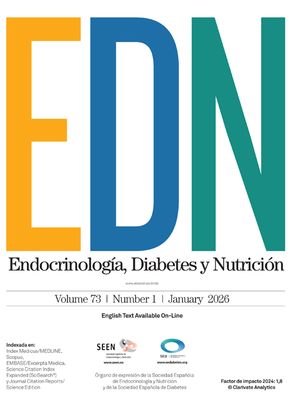Megestrol acetate (MA) is a synthetic progestogen widely used in patients with cancer cachexia, in elderly subjects at risk of malnutrition, and in patients with human immunodeficiency virus infection because of its effect to promote appetite and weight increase.1,2 It is however not free from side effects, among which potential development of adrenal insufficiency (AI) or Cushing's syndrome due to an antagonist or a weak agonist action for the glucocorticoid receptor, respectively, has been reported.
Two clinical cases seen at our hospital where biochemical AI occurred in the setting of treatment with MA are reported below.
The first patient was a 67-year-old male admitted to psychiatry for behavioral changes. The patient had type 2 diabetes mellitus treated with gliclazide and mantle cell lymphoma diagnosed 5 years before, treated with chemotherapy and hematopoietic stem cell transplantation and on complete remission at the time. He had been treated with MA 160mg/day for the past 2 years. Magnetic resonance imaging of the brain showed frontotemporal atrophy, while laboratory test results were as follows: cortisol, 2.19μg/dL (normal range [NR], 8–25μg/dL); ACTH, <5pg/mL (NR, 9–40pg/mL); testosterone, 1.92ng/mL (NR, 3–10ng/mL); FSH, 9.4mU/mL (NR: 2.0–10.0mU/mL); and LH, 2.7mU/mL (NR, 1.5–9.3mU/mL). Serum electrolyte levels were normal. The patient had no symptoms or signs suggesting AI. Prior corticosteroid treatment was ruled out. An ACTH performed to confirm diagnosis showed cortisol levels of 2.8, 14.0, and 18.0μg/dL at 0, 30, and 60min,3 respectively. Because of the borderline response, treatment was started with hydrocortisone 10mg/day, and MA was discontinued. One month later, the patient had a basal cortisol level of 20.7μg/dL and an ACTH level of 33.2pg/dL, and hydrocortisone was therefore discontinued; testosterone was also normalized.
The second patient was a 70-year-old male with history of hypertension, dyslipidemia, and an esophageal tumor diagnosed in 2011. After surgery, moderated mixed malnutrition was diagnosed, and treatment was therefore started with MA 160mg/day. Laboratory tests results included: basal cortisol, 7.36μg/dL with ACTH 17.6pg/mL; testosterone, 1.03ng/mL; LH, 5.5mU/mL, and FSH, 13.7mU/mL. Levels of all other pituitary and adrenal hormones and electrolytes were normal. An ACTH stimulation test revealed cortisol levels of 1.36, 8.8, and 10.2μg/day at 0, 30, and 60min,3 respectively. Treatment was started with hydrocortisone 20mg/day in three divided doses, and MA was discontinued. After 2 months, values of ACTH (12.5ng/mL), cortisol (19.2μg/dL), and testosterone (5.78ng/mL) were normalized.
MA is a synthetic progestogen which cross reacts with the glucocorticoid receptor,4 to which it is bound with approximately half the affinity of dexamethasone, but double the affinity of endogenous cortisol.5 MA promotes appetite and weight increase by an still unknown mechanism, and is therefore widely used in patients at risk of malnutrition and cachexia.1,2 It is also used in some hormone-dependent cancers (breast, endometrium, and prostate) because it has been seen to decrease estrogen levels in females and testosterone levels in males.6 The clinical cases reported showed low testosterone levels, which normalized after MA discontinuation. This action should also be taken into account because of the effects derived from sexual hormone deficiency. Other adverse effects reported with MA include thromboembolism, gynecomastia, hypertension, or hyperglycemia.
AI appears to be a common complication2,7 which may be underdiagnosed in these patients because symptoms of cortisol deficiency may sometimes be confused with those of cachexia (fatigue, nausea, gastrointestinal discomfort, etc.). Several studies have shown that the glucocorticoid activity of MA itself may exert, in addition to its action on the glucocorticoid receptor at peripheral level, suppression of the axis at pituitary and/or hypothalamic level,8 and may therefore induce AI.2,6,7,9,10 However, symptoms of severe AI have only occurred in some cases.2,7 This could be justified by the ability of MA to act as a glucocorticoid agonist and to replace the endogenous activity under basal conditions.3 There are however situations where treatment with MA may trigger acute AI, including sudden MA discontinuation, which causes its glucocorticoid agonist action to cease abruptly; lack of recognition of a clinical stress situation where MA activity is not sufficient to cover the additional glucocorticoid needs; and the situation where binding of MA to glucocorticoid receptors would act in stress situations as antagonist, preventing the binding of other more potent glucocorticoid derivatives, potentially triggering an adrenal crisis.7 Because of this, in order to prevent AI, some authors suggest supplementation with exogenous corticoids in patients treated with MA for stress situations, and also during MA tapering.2,7,9 Basal cortisol measurement or even a cortisol stimulation test may be advised for MA discontinuation.
On the other hand, occurrence of Cushing's syndrome by mechanisms which are not well known is also documented in the setting of treatment with MA. One of the hypotheses is that MA exerts some intrinsic glucocorticoid activity at peripheral level.1 Thus, in cases where this effect predominated over suppression of the hypothalamic–pituitary–adrenal axis, changes characteristic of hypercortisolism could occur, with low endogenous cortisol levels, as occurs with exogenous administration of cortisol and its derivatives.4
Although no clear data are available in this regard, it appears that longer treatment duration (longer than 6 weeks) and higher dosage (>400mg/day) could promote the occurrence of Cushing's syndrome.11 Special caution is therefore required when MA is used for its action on the cortisol axis because of the possibility that a same patient experiences Cushing's syndrome and subsequent AI after sudden MA discontinuation.12
In conclusion, since MA is a drug commonly used in some situations, special attention should be paid to its side effects, particularly those related to the cortisol axis because of its greater severity. Additional studies are needed to determine in which cases the patient would benefit from treatment with MA based on the risk/benefit ratio, and whether empirical supplementation with exogenous corticoids should be given.
Conflicts of interestThe authors state that they have no conflicts of interest.
Please cite this article as: García-Castells AM, Argente-Pla M, García-Malpartida K, Querol-Ripoll R, Merino-Torres JF. Insuficiencia suprarrenal inducida por acetato de megestrol: a propósito de 2 casos. Endocrinol Nutr. 2015;62:515–516.




